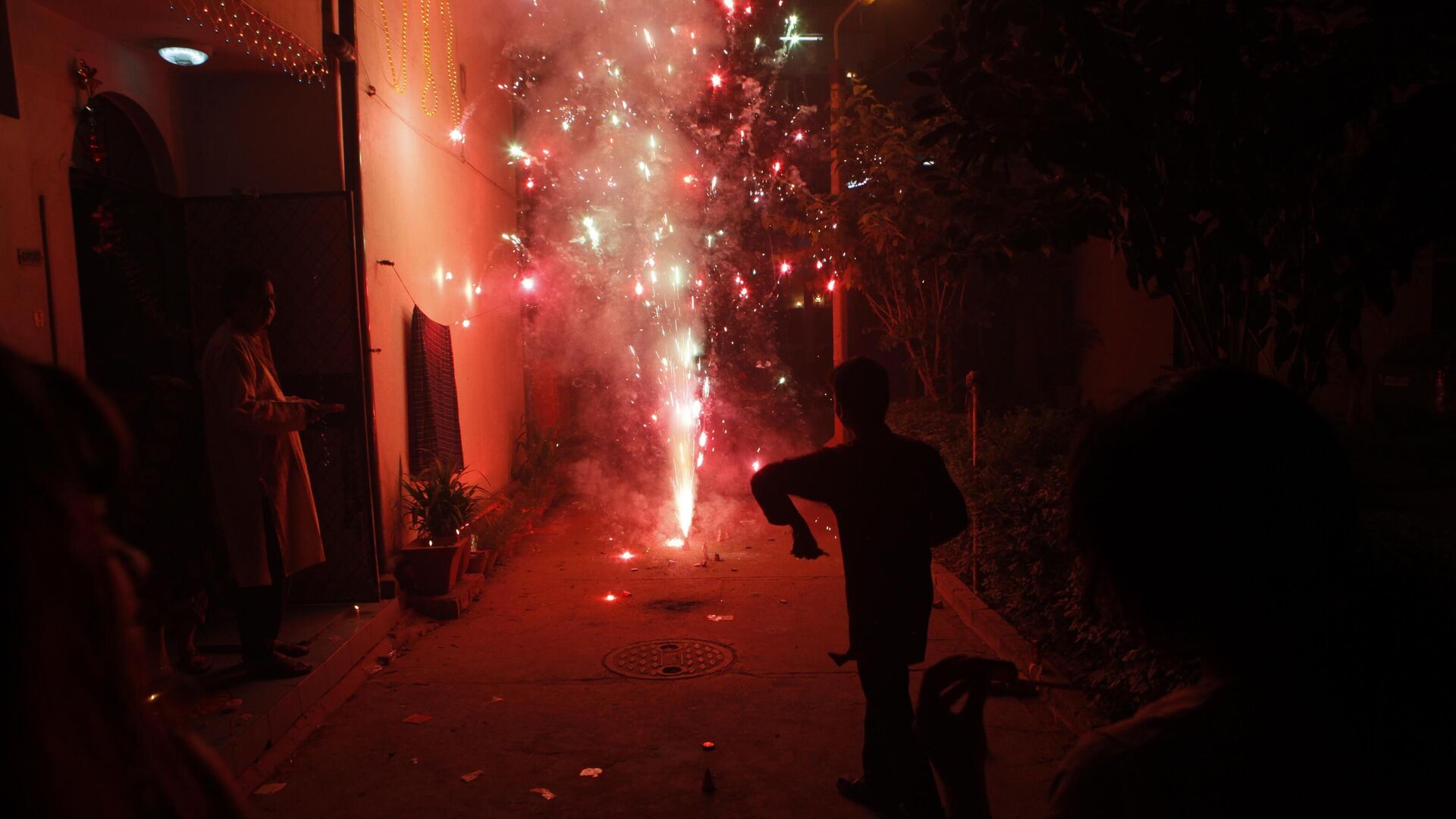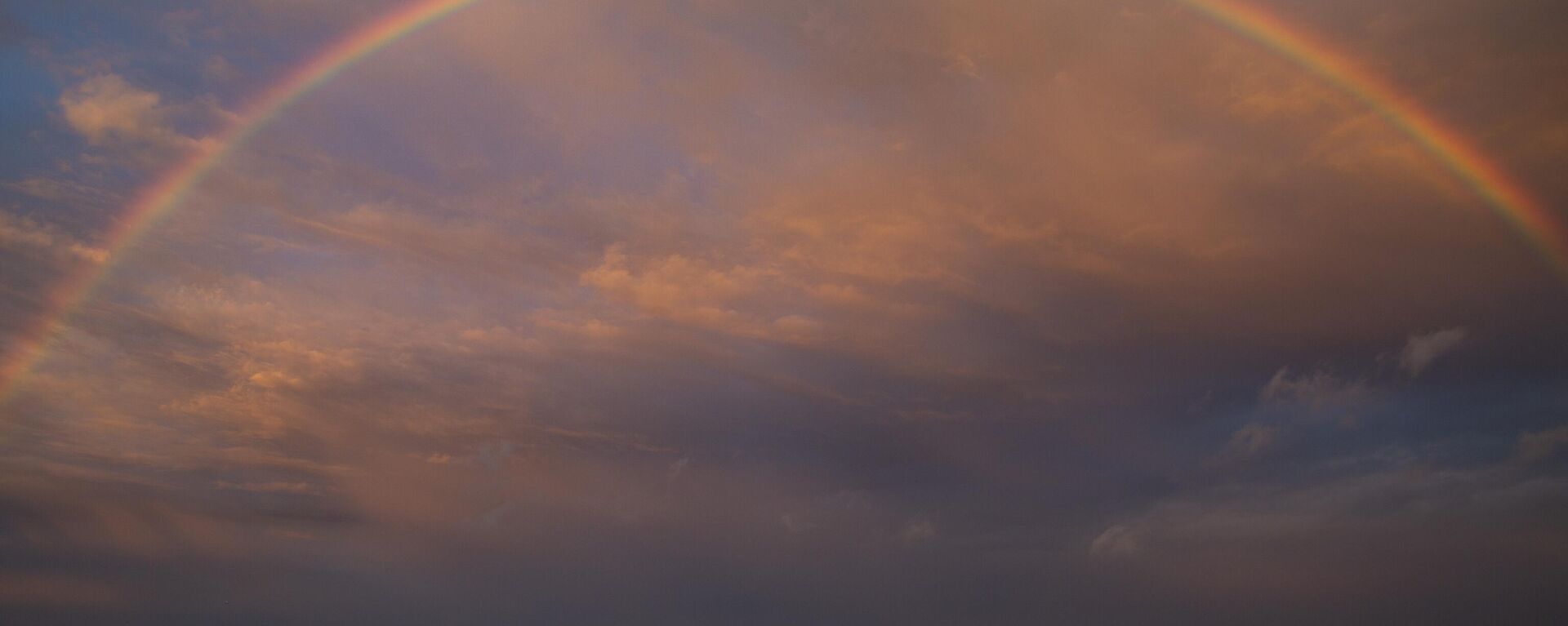https://sputniknews.in/20231108/are-fireworks-banned-in-india-on-diwali-5309091.html
Did India Ban Diwali Fireworks?
Did India Ban Diwali Fireworks?
Sputnik India
The worst situation of air pollution in Delhi prompted the Supreme Court of India to ask the state governments to make people aware about the harm of bursting firecrackers.
2023-11-08T22:48+0530
2023-11-08T22:48+0530
2023-11-10T18:28+0530
delhi
india
diwali
air pollution
air quality index
manang air
haryana
new delhi
https://cdn1.img.sputniknews.in/img/07e7/0b/04/5232839_0:141:3139:1907_1920x0_80_0_0_6776fd23fc375922eb8e5eb8916b2203.jpg
Ahead of the Diwali, the Hindu festival of light, air quality in Delhi and its adjoining areas has worsened to a very severe category, creating a thick layer of smog.As the air quality in the national capital continues to be in the severe category, the matter was also taken up by the Supreme Court of India, which slammed various state governments for not acting on the issue.The court, in its order, said a complete ban on bursting firecrackers is not possible until people don't act upon themselves, adding that pollution will not end by limiting fireworks.The top court reiterated its 2021 order to ban crackers containing barium salts as they are harmful to health.Are Firecrackers Prohibited at the Festival?Bursting firecrackers are completely banned in Delhi, including green crackers.The Delhi government first banned firecrackers in 2017, as the city quality plunged into a severe category. In 2018, the Supreme Court banned all firecrackers, except green crackers without barium salts.However, as air quality worsens and authorities have difficulty differentiating between green and conventional crackers, the government imposed a blanket ban on all firecrackers in 2020.This year, too, Delhi Pollution Control Committee (DPCC) banned the manufacturing, storage, bursting, and sale of all types of crackers till January 1.Does Banning Firecrackers Bring Down AQI?Although firecrackers are banned in Delhi, the rule is flouted every year, further downgrading the air quality.In 2021, a day after Diwali, Delhi registered an AQI of 462 (severe category), and in 2022, the post-Diwali AQI was 303 (very poor category).AQI is an indicator of air pollution: a reading between zero and 50 is "good", between 51 and 100 "satisfactory", 101 and 200 "moderate", 201 and 300 "poor", 301 and 400 "very poor", and 401 and 500 "severe". Prolonged exposure to an AQI which is "very poor" or worse is likely to cause respiratory problems. Delhi's AQI at this time of the year often falls around 300.According to reports, fireworks release pollutants such as carbon dioxide, carbon monoxide, sulphur dioxide, particulate matter, and "metal salts" like aluminium, manganese, and cadmium, all are injurious to health.In Delhi, apart from firecracker burning, the other prominent reasons for deteriorating AQI are stubble burning in neighboring states, weather conditions, such as drop in temperature and low wind speeds around this time of the year, all making it difficult to disperse pollutants.
https://sputniknews.in/20231106/artificial-rain-effective-solution-to-combat-delhis-air-pollution-crisis--5261303.html
delhi
india
haryana
new delhi
Sputnik India
feedback.hindi@sputniknews.com
+74956456601
MIA „Rossiya Segodnya“
2023
Deexa Khanduri
https://cdn1.img.sputniknews.in/img/07e6/0c/13/138923_52:0:533:481_100x100_80_0_0_cadf23d341691fc65ff2b22fd1afe584.jpg
Deexa Khanduri
https://cdn1.img.sputniknews.in/img/07e6/0c/13/138923_52:0:533:481_100x100_80_0_0_cadf23d341691fc65ff2b22fd1afe584.jpg
News
en_IN
Sputnik India
feedback.hindi@sputniknews.com
+74956456601
MIA „Rossiya Segodnya“
Sputnik India
feedback.hindi@sputniknews.com
+74956456601
MIA „Rossiya Segodnya“
Deexa Khanduri
https://cdn1.img.sputniknews.in/img/07e6/0c/13/138923_52:0:533:481_100x100_80_0_0_cadf23d341691fc65ff2b22fd1afe584.jpg
diwali 2023, diwali, happy diwali, diwali 2023 date, happy diwali wishes, diwali wishes, diwali rangoli, happy diwali images, rangoli design for diwali, diwali kab hai, rangoli for diwali, diwali images, rangoli designs for diwali, diwali wishes in hindi, diwali drawing, kabhi eid kabhi diwali, happy diwali wishes 2023, diwali rangoli designs, diwali wishes in english, diwali quotes, 2023 diwali date, diwali wishes in marathi, dev diwali 2023, diwali date, happy diwali wishes in hindi, when is diwali in 2023, essay on diwali, diwali background, diwali kab ki hai, diwali rangoli design, happy diwali images 2023, diwali decoration ideas, diwali wishes images, diwali puja time 2023, diwali puja time, when is diwali, diwali crackers, diwali essay, diwali photo, diwali status, 2023 diwali date, happy diwali 2023, diwali greetings, diwali puja 2023, diwali in 2023, diwali kab hai 2023
diwali 2023, diwali, happy diwali, diwali 2023 date, happy diwali wishes, diwali wishes, diwali rangoli, happy diwali images, rangoli design for diwali, diwali kab hai, rangoli for diwali, diwali images, rangoli designs for diwali, diwali wishes in hindi, diwali drawing, kabhi eid kabhi diwali, happy diwali wishes 2023, diwali rangoli designs, diwali wishes in english, diwali quotes, 2023 diwali date, diwali wishes in marathi, dev diwali 2023, diwali date, happy diwali wishes in hindi, when is diwali in 2023, essay on diwali, diwali background, diwali kab ki hai, diwali rangoli design, happy diwali images 2023, diwali decoration ideas, diwali wishes images, diwali puja time 2023, diwali puja time, when is diwali, diwali crackers, diwali essay, diwali photo, diwali status, 2023 diwali date, happy diwali 2023, diwali greetings, diwali puja 2023, diwali in 2023, diwali kab hai 2023
Did India Ban Diwali Fireworks?
22:48 08.11.2023 (Updated: 18:28 10.11.2023) Deexa Khanduri
Sputnik correspondent
Air pollution in Delhi prompted the Supreme Court of India to ask the state governments to make people aware about the harm of bursting firecrackers.
Ahead of the Diwali, the Hindu festival of light, air quality in Delhi and its adjoining areas has worsened to a very severe category, creating a thick layer of smog.
As the air quality in the national capital continues to be in the severe category, the matter was also taken up by the Supreme Court of India, which slammed various state governments for not acting on the issue.
The Supreme Court directed all states and Union Territories to comply with its orders of imposing curbs on bursting firecrackers during Diwali and at other times of the year on November 7. However, the top court has not banned bursting firecrackers on Diwali across India.
The court, in its order, said a complete ban on bursting firecrackers is not possible until people don't act upon themselves, adding that pollution will not end by limiting fireworks.
The top court reiterated its 2021 order to ban crackers
containing barium salts as they are harmful to health.
Are Firecrackers Prohibited at the Festival?
Bursting firecrackers are completely banned in Delhi, including green crackers.
The Delhi government first banned firecrackers in 2017, as the city quality plunged into a severe category. In 2018, the Supreme Court
banned all firecrackers, except green crackers without barium salts.
However, as air quality worsens and authorities have difficulty differentiating between green and conventional crackers, the government imposed a blanket ban on all firecrackers in 2020.
This year, too, Delhi Pollution Control Committee (DPCC) banned the manufacturing, storage, bursting, and sale of all types of crackers till January 1.
Does Banning Firecrackers Bring Down AQI?
Although firecrackers are banned in Delhi, the rule is flouted every year, further downgrading the air quality.
In 2021, a day after Diwali, Delhi registered an AQI of 462 (severe category), and in 2022, the post-Diwali AQI was 303 (very poor category).
AQI is an indicator of air pollution: a reading between zero and 50 is "good", between 51 and 100 "satisfactory",
101 and 200 "moderate", 201 and 300 "poor", 301 and 400 "very poor", and 401 and 500 "severe". Prolonged exposure to an AQI which is "very poor" or worse is likely to cause respiratory problems. Delhi's AQI at this time of the year
often falls around 300.According to reports, fireworks release pollutants such as carbon dioxide, carbon monoxide, sulphur dioxide, particulate matter, and "metal salts" like aluminium, manganese, and cadmium, all are injurious to health.
In Delhi, apart from firecracker burning, the other prominent reasons for deteriorating AQI are stubble burning in neighboring states,
weather conditions, such as drop in temperature and low wind speeds around this time of the year, all making it difficult to disperse pollutants.



